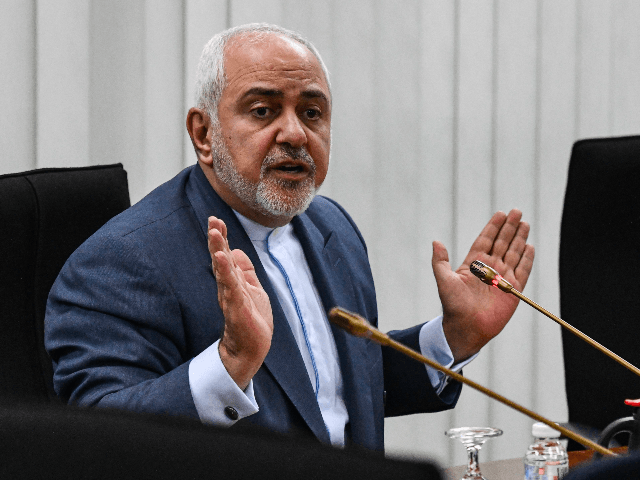Iranian Foreign Minister Mohammad Javad Zarif gave an interview to Germany’s Der Spiegel on Saturday in which he said Iran would be willing to negotiate with the United States if the U.S. unconditionally drops its economic sanctions.
President Donald Trump brusquely dismissed Zarif’s offer as a non-starter, while “hardliners” in the Iranian theocracy were reportedly outraged at Zarif for suggesting negotiations after an American airstrike killed Iranian Gen. Qasem Soleimani.
Zarif’s interview with Der Spiegel was hardly conciliatory in tone. He said it was “a disaster for Europe to be so subservient to the U.S.” because the Europeans have not produced the economic concessions demanded by Iran to offset the pressure of American sanctions.
He then threatened the Europeans with unspecified “consequences” if they keep pushing a complaint about Iranian violations of the JCPOA nuclear deal to the United Nations Security Council, although he claimed Iran has no intention of building a nuclear bomb even if it fully withdraws from the JCPOA, tossing in a reference to Iran’s absurd claim that its leaders think nuclear weapons are illegal under Islamic law.
What Zarif said about sanctions is nothing new, as the Iranians have been demanding unilateral sanctions relief as the price for resuming negotiations ever since President Trump pulled out of the JCPOA.
Der Spiegel asked if Zarif rules out “the possibility of negotiations with the U.S. following Soleimani’s murder” – an outrageously slanted way to ask the question, as Soleimani was not “murdered” but was a legitimate military target illegally operating on foreign soil and orchestrating attacks against Americans at the time of his death.
Zarif replied:
No, I never rule out the possibility that people will change their approach and recognize the realities. For us, it doesn’t matter who is sitting in the White House. What matters is how they behave. The Trump administration can correct its past, lift the sanctions and come back to the negotiating table. We’re still at the negotiating table. They’re the ones who left. The U.S. has inflicted great harm on the Iranian people. The day will come when they will have to compensate for that. We have a lot of patience.
President Trump dismissed Zarif’s remarks to Der Spiegel with a brusque tweet.
Iranian Foreign Minister says Iran wants to negotiate with The United States, but wants sanctions removed. @FoxNews @OANN No Thanks!
— Donald J. Trump (@realDonaldTrump) January 26, 2020
An apoplectic Zarif fired back on Twitter that Trump misunderstood him and he was making demands of the United States, not offering to negotiate.
.@realdonaldtrump is better advised to base his foreign policy comments & decisions on facts, rather than @FoxNews headlines or his Farsi translators
To be better informed, he can read my entire interview (in English) https://t.co/eZR8NzuWXV
Too many words? Then just read this: pic.twitter.com/URkbUll49P
— Javad Zarif (@JZarif) January 26, 2020
According to the Kurdish news service Rudaw, some “hardline” Iranians also thought Zarif was offering to negotiate and branded him a fool and a traitor for doing so.
“Do we have anyone as stupid and as treacherous as the one who speaks about the possibility of negotiation with the terrorists of Baghdad airport and they respond by saying ‘No Thanks,’” said one such Iranian critic, referring to Soleimani’s death near the Baghdad airport and Trump’s curt response to Zarif’s Der Spiegel interview.
“How soon this treacherous Zarif filled the empty chair,” said another Iranian, essentially accusing Zarif of forgetting about Soleimani’s death.
“Trump has said in clear terms that he personally issued the order to assassinate commander Qasem Soleimani. What objective is Mr. Zarif pursuing by negotiating with the killer of Commander Soleimani?” a “hardline” Iranian newspaper asked.
For all of Zarif’s insulting bluster about the Europeans “serving” America and needing to be whipped back into line by Iranian threats, there is every indication France, Germany, and the United Kingdom are backing down from their threat to reimpose sanctions of their own after Iran’s clear violations of the JCPOA.
European diplomats on Friday said they have “extended the process” of filing their complaint with the U.N. Security Council to give “diplomacy” more time to work.
“Notwithstanding differences on modalities, there is agreement that more time is needed due to the complexity of the issues involved. The timeline is therefore extended,” European Union foreign policy chief Josep Borrell said.
“European leaders have officially called for Iran to reverse violations of the nuclear deal that Tehran has made in recent months. But European diplomats don’t expect Iran to reverse course and privately say they are prepared to tolerate those steps and keep discussions going with Iran for the foreseeable future. They are preparing to extend discussions well beyond the 60-day period,” the Wall Street Journal reported on Friday.

COMMENTS
Please let us know if you're having issues with commenting.